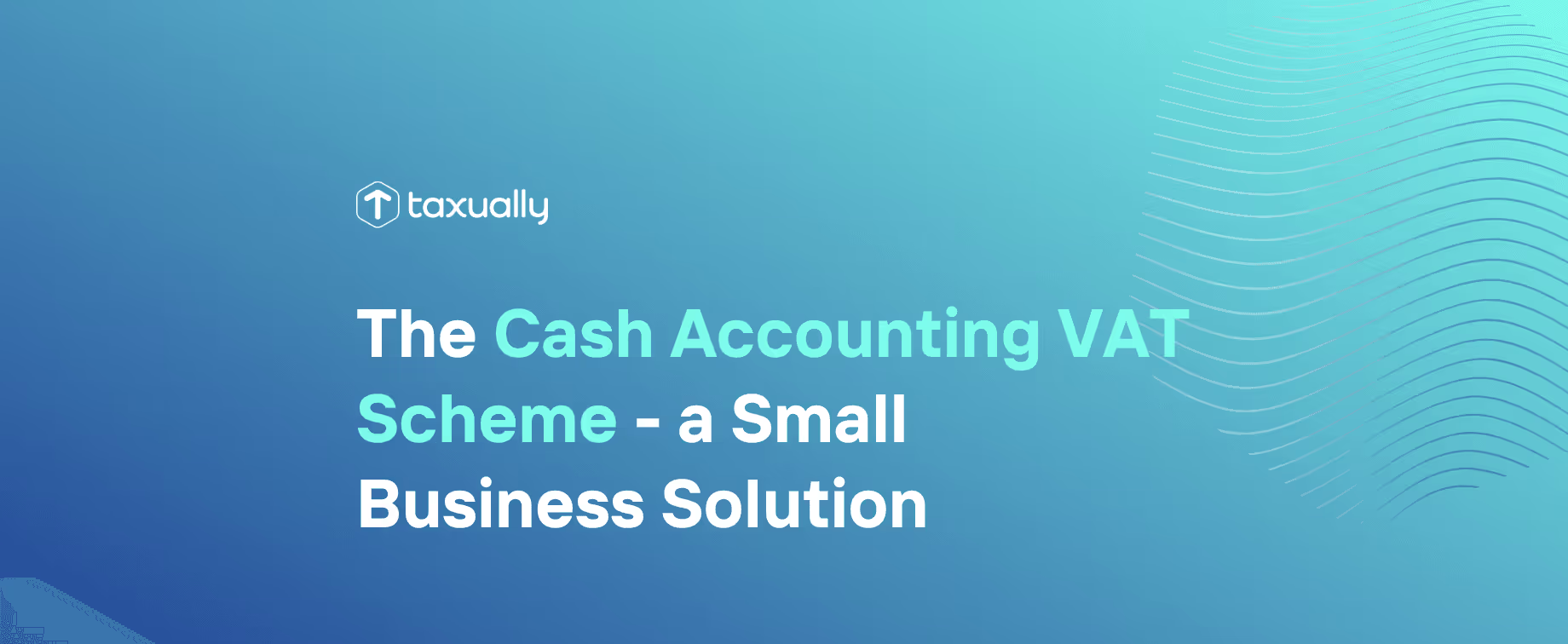Key takeaways
- Cash Accounting VAT Scheme is a beneficial alternative accounting method for small businesses with taxable turnover below £1.35 million, allowing them to improve cash flow and reclaim input tax when suppliers have been paid.
- Eligibility criteria, joining/leaving rules, calculations of payments & transactions excluded must be adhered to in order to comply with HMRC regulations.
- Combining the Cash Accounting Scheme with other schemes can help manage bad debts and unpaid invoices.
Have you ever wondered if there’s a more cash-friendly way to handle your Value-Added Tax (VAT) obligations as a small business owner? Enter the Cash Accounting VAT Scheme, an alternative to the standard invoice-based method that can improve your cash flow and reduce the time spent on VAT accounting operations.
In this post, we’ll look more closely at the scheme, comparing it to the standard VAT accounting method, discussing eligibility criteria, and exploring its impact on various aspects of business. Read on to discover if the Cash Accounting VAT Scheme is the right choice for your business.
Cash Accounting VAT Scheme - the basics
The VAT Cash Accounting Scheme is an alternative VAT accounting method that allows businesses to:
- Pay VAT when payments are actually received from customers, rather than upon invoicing.
- Improve cash flow, as businesses only pay VAT when they have the money in hand.
- Reclaim input tax when suppliers have been paid.
This scheme is beneficial for small businesses that meet the required criteria. By offering improved cash flow and reduced time spent on VAT accounting activities, the Cash Accounting VAT Scheme provides a more manageable alternative for small business owners.
However, a drawback of this scheme is that input tax can only be reclaimed when suppliers have been paid.
Eligibility criteria for the Cash Accounting VAT Scheme

To be eligible for the Cash Accounting VAT Scheme, businesses must meet certain criteria, including having a taxable turnover of less than £1.35 million and being free from insolvency and VAT evasion. Under this scheme, businesses pay VAT to HMRC based on actual payments received and made, as opposed to invoices issued and received.
There are exceptions, though. Some transactions, such as imports and exports, are not eligible for the Cash Accounting VAT Scheme and must be accounted for using normal VAT accounting methods. This ensures that the appropriate amount of VAT is paid, maintaining the integrity and fairness of the VAT system.
How to join and leave the Cash Accounting VAT Scheme
Joining the Cash Accounting VAT Scheme is done at the start of a VAT accounting period, while leaving the scheme is done at the end of a VAT accounting period, following specific rules and procedures. For businesses that wish to leave the scheme, they must account for all outstanding VAT on supplies made but not yet paid for, even if payment has not been received from the customer.
It’s important to note that the Cash Accounting Scheme helps manage bad debts and unpaid invoices by accounting for VAT only upon receipt of payment. However, businesses must maintain normal cash accounting records and adhere to specific regulations upon exiting the scheme.
Calculating VAT payments under the Cash Accounting Scheme
Under the Cash Accounting Scheme, VAT payments are calculated based on actual payments received from customers and made to suppliers, rather than on invoices issued and received. This means that businesses pay VAT on sales when customers pay and can reclaim VAT on purchases when they pay their suppliers. This scheme is designed to align VAT payments with cash flow, making it easier to manage and predict VAT obligations.
It also means that if a business exits the Cash Accounting VAT Scheme, it will be required to account for outstanding VAT payments on supplies that were made but not yet paid for, even if they haven’t received payment from the customer.
Transactions excluded from the Cash Accounting Scheme
Certain transactions are not eligible for the Cash Accounting Scheme and must instead be accounted for using normal VAT accounting methods. These include:
- Supplies where a VAT invoice is issued and payment is not received within 6 months.
- Supplies subject to the reverse charge mechanism.
- Supplies of goods under certain conditions (imports and exports, for example).
These exclusions exist to ensure that the appropriate amount of VAT is paid, maintaining the integrity and fairness of the VAT system. Businesses using the Cash Accounting Scheme must be aware of these exclusions and account for them accordingly to avoid any potential compliance issues with HMRC.
Combining Cash Accounting with other VAT schemes
Businesses using the Cash Accounting Scheme can also use the Annual Accounting Scheme, but not the VAT Flat Rate Scheme. This provides greater flexibility and simplification when managing VAT obligations, as businesses can tailor their VAT accounting methods to best suit their needs and circumstances.
However, businesses using the Cash Accounting Scheme must adhere to specific rules when combining schemes. By following these rules and ensuring that VAT accounting methods are properly aligned and managed, businesses can optimise their VAT management and reduce the risk of compliance issues.
Managing VAT groups and Cash Accounting
A VAT group is a collective of companies under common control that are registered jointly for VAT purposes. The turnover limit specified for the Cash Accounting Scheme applies to the entire VAT group’s VAT taxable turnover. No individual entity within the group is exempted. If the total taxable turnover of the entire group exceeds £1.35 million, it becomes ineligible for the Cash Accounting Scheme. It's important to ensure compliance with all VAT regulations to avoid any potential VAT offence.
HMRC does not permit one or more companies in a VAT group to operate cash accounting while others adhere to standard invoice-based requirements. This ensures consistency and compliance within the VAT group, making it easier for businesses and HMRC to manage and monitor VAT obligations.
Handling bad debts and unpaid invoices
The Cash Accounting Scheme facilitates the management of bad debts and unpaid invoices by accounting for VAT only upon receipt of payment. This means that businesses do not need to account for VAT on bad debts, providing a significant advantage over the standard invoice accounting scheme. In this context, the Cash Accounting Scheme offers a more efficient approach to handling VAT compared to the traditional invoice-based method.
When leaving the Cash Accounting Scheme, however, businesses must account for all outstanding VAT on supplies made but not yet paid for, even if payment has not been received from the customer. This is an important consideration when deciding whether to join or leave the scheme, as it could impact cash flow and VAT obligations.
Insolvency and the Cash Accounting Scheme
In case of insolvency, outstanding VAT must be accounted for in accordance with pre-insolvency regulations. Supplies procured and received prior to insolvency must be accounted for, and any outstanding VAT on these supplies must be reported on the pre-insolvency VAT returns.
An insolvency practitioner may operate the Cash Accounting Scheme if certain conditions are met. Their role typically includes:
- Cancelling the VAT registration.
- Organising the payment of VAT.
- Ensuring that all outstanding VAT obligations are properly managed and accounted for during the insolvency process.
Dealing with HMRC and the Cash Accounting Scheme

HMRC can withdraw a business from the Cash Accounting Scheme if it’s found that the business no longer meets the eligibility criteria or if there are concerns about compliance. However, businesses have the right to challenge the decision and appeal to a VAT tribunal if necessary.
It’s essential that businesses using the Cash Accounting Scheme maintain open communication with HMRC, ensuring that they're aware of any changes in eligibility or accounting methods. By working closely with HMRC and following the rules and regulations of the Cash Accounting Scheme, businesses can minimise the risk of compliance issues and maintain a strong working relationship with the tax authority.
Conclusion
The Cash Accounting VAT Scheme offers a more cash-friendly alternative for small businesses to manage their VAT obligations. With benefits such as improved cash flow and reduced time spent on VAT accounting, this scheme can be a valuable tool for businesses that meet eligibility criteria.
That being said, it’s crucial to be aware of the scheme’s limitations, exclusions, and rules when combined with other VAT schemes, as well as how it impacts various aspects of business operations. By understanding the ins and outs of the Cash Accounting VAT Scheme, businesses can make informed decisions on whether it’s the right choice for their VAT management needs.
Do you need help with your VAT compliance? Book a free call with one of our VAT experts to find bespoke solutions for your business, optimize your VAT costs, and reach millions of new potential customers.
Frequently asked questions
New Year's Day - 1/1/2024Memorial Day - 5/27/20244th of July - 7/4/2024Labor Day - 9/2/2024Thanksgiving Day - 11/28/2024Day after Thanksgiving - 11/29/2024Christmas Eve - 12/24/2024Christmas Day - 12/25/2024
What is cash accounting for VAT?
Cash accounting for VAT allows businesses to pay HMRC based on cash received from customers rather than invoices issued. This is beneficial as it improves cash flow, with businesses only having to pay VAT once their customers have paid them.
This method of accounting is especially useful for small businesses, as it allows them to manage their cash flow more effectively and reduce the risks associated with late payments. It also helps to reduce the administrative burden of keeping records.
What is the cash accounting limit for VAT?
Businesses with an estimated VAT taxable turnover of £1.35 million or less in the next 12 months can use the Cash Accounting Scheme. However, they must leave the scheme if their turnover exceeds the £1.6m threshold at the end of the relevant VAT return period.
This means that businesses must be aware of their turnover and plan accordingly to ensure they're not over the threshold when their VAT return period ends.
What is the main advantage of the Cash Accounting VAT Scheme?
The main advantage of the Cash Accounting VAT Scheme is improved cash flow, as businesses are only required to pay VAT when they receive payments from customers, rather than upon invoicing. Therefore, businesses can keep more of their money in the bank for longer, allowing them to invest in growth and development.
It also reduces the amount of paperwork and administrative burden associated with VAT, as businesses don’t need to keep track of invoices.



















